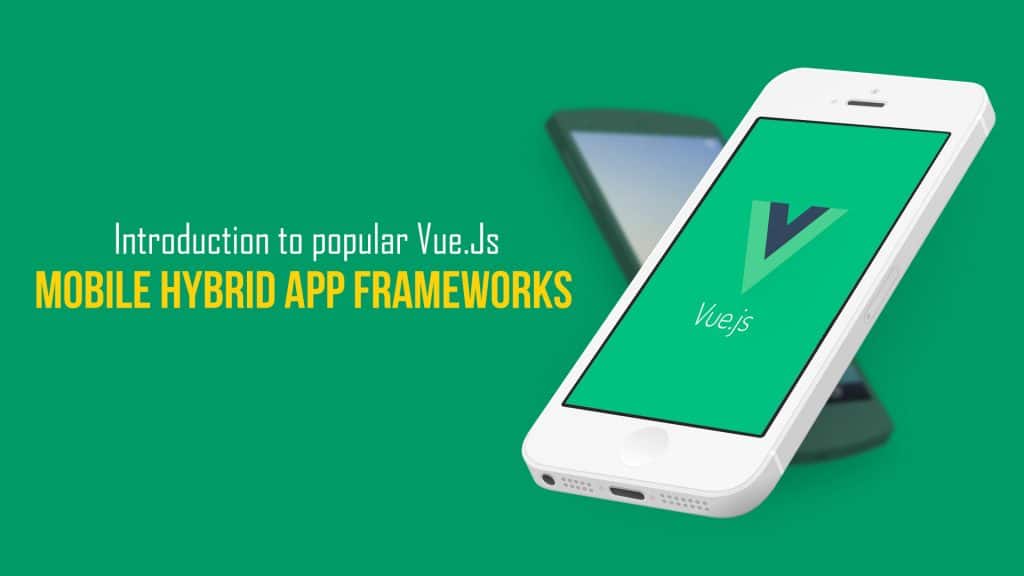Jump to Section
What is Vue.js
Vue.js is a framework for the development of progressive apps and enables your web apps to deliver an app-like experience to the users. In combination with Cordova and with the help of a UI framework, Vue can be very effective in developing hybrid mobile applications. Vue.js is among one of the advanced hybrid app frameworks that is rapidly gaining popularity and has become a strong competitor to the leading frameworks, including AngularJS, ReactJS, ReactNative, Knockout.js etc.
There are many hybrid app frameworks that can leverage the power of Vue.js to build beautiful mobile apps. This article discusses frameworks that are integrated with Vue and allow you to build hybrid apps with Vue and Cordova.
Popular Hybrid App Frameworks Supporting Vue.js:
Quasar
Quasar allows you to build applications for multiple target environments from one source code. It boasts of a long list of built-in UI components and a full-featured CSS framework that makes theme development seem like a breeze. With its wide platform support, including iOS, Android, Windows phones, Blackberry, Chrome, Firefox, IE/Edge, Safari and Opera, Quasar is a promising framework that tightly integrates with Vue.js. A major upside of Quasar is its low memory footprint, which helps your apps run fast consuming less memory on a device.
The only downside at this point is its default theme that doesn’t feel sufficiently native on iOS and material design, both. However, it’s a clear winner when it comes to coverage and quality of documentation.
Onsen UI
Onsen UI is a fast evolving framework and offers a smaller but sturdier collection of UI components for multiple target platforms. The native appearance and behaviour of the Onsen components are impressive and better than most other UI libraries that integrate with Vue.
Two of the major reasons for selecting Onsen are:
- It’s very stable and enjoys a strong community, freeing you from the worries related to its support in the future
- Components are really native in appearance and are growing very rapidly, thanks to the active contributions from the community.
Onsen UI is one of the most popular frameworks that work with Vue.js and is supported very well. This is also one of top recommendations for a framework for hybrid mobile development using Vue.js.
Framework7
Framework7 is another open-source project that supports building of iOS as well as Material design-based user interfaces. Although it already enjoys a large user base and is fairly stable, it does not support other platforms than android and iOS. Another advantage of using Framework7 is its support for plugins, which can be extended as well. However, it does not support custom themes out-of-the-box despite a very large collection of pre-built components it provides, meeting most of your needs.
Overall, Framework7 is a great framework which does most things neatly and grants a developer sufficient breadth in his/her selection of front-end goodness.
Vuetify.js
Vuetify is a component framework that works with Vue and has been developed following the principles of material design. Although it’s not very versatile, meaning that it doesn’t support multiple other platforms, it does its job pretty well for the material design. A great advantage while developing using Vuetify is that you will never fall short of availability of support; thanks to the large and active community that contributes to its development.
While developing with Vuetify you can use the CLI packages of Vue.js and hit the ground running with a beautiful app, though based only on a material design.
Vue Material
Another framework, similar to Vuetify.js, Vue Material is a lightweight framework that complies exactly with the specifications of Google’s material design. Built specifically for Vue.js, Vue Material allows you to build aesthetically pleasing apps which work across screen sizes on all the modern browsers. Equipped with capabilities, such as dynamic themes, components on demand, and an easy-to-use API, it reduces the development effort for the front-end development.
However, it only fits the bill if you’re building an app that follows material design. This means that it won’t support the other platforms, such as iOS, Windows mobile etc.
All the above frameworks are licensed as open-source and under active development as we speak. Therefore, based on your needs, you can conveniently check out their source codes, followership and understand their exact fitness for your specific purpose.
Whereas Vue.js provides a great experience while developing a progress web app, it is equally useful while developing applications for mobile devices. The frameworks listed in this article can help you speed up your development and bring your hybrid mobile application to life minimizing the development effort and the total cost of ownership (TCO).
You can also use these frameworks, particularly the ones that support only material design, to build out quick & disposable prototypes for the larger enterprise apps and can avoid having to buy expensive tools that tie you down into the vendors’ environments and contracts.
You can consult with us to discuss your development requirements and seek assistance & guidance from the expert consultants and mobile app developers experienced with Vue.js and several other market-leading frameworks. With our extensive experience building the end-to-end mobility solutions, enterprise as well as consumer-oriented, you are in safe hands.
We are a thought leader in mobile development and work in collaboration with start-ups as well as the established enterprises through all the stages of application development. For a risk-free assessment, contact us today and take advantage of our deep expertise to get a step closer to building what you have been aspiring for.
- LinkedIn Scraper | LinkedIn Data Extractor Software Tool - February 22, 2021
- Is Web Scraping Legal? - February 15, 2021
- What Is Data Scraping? - February 10, 2021

